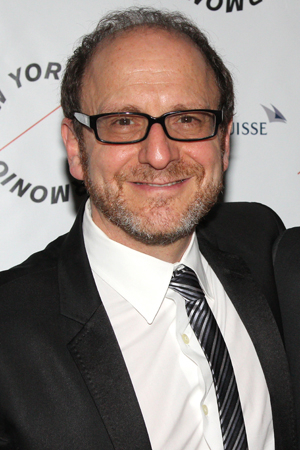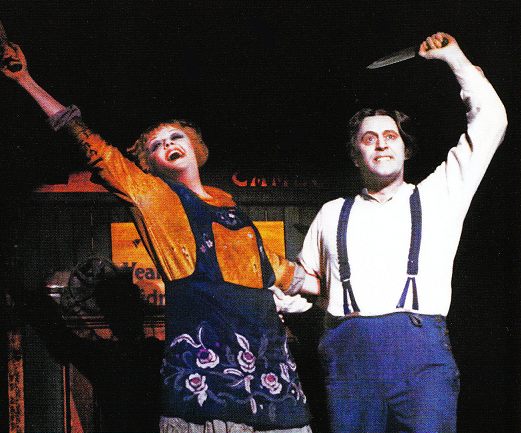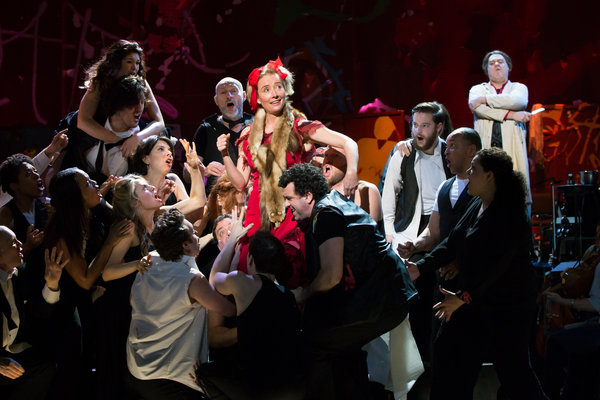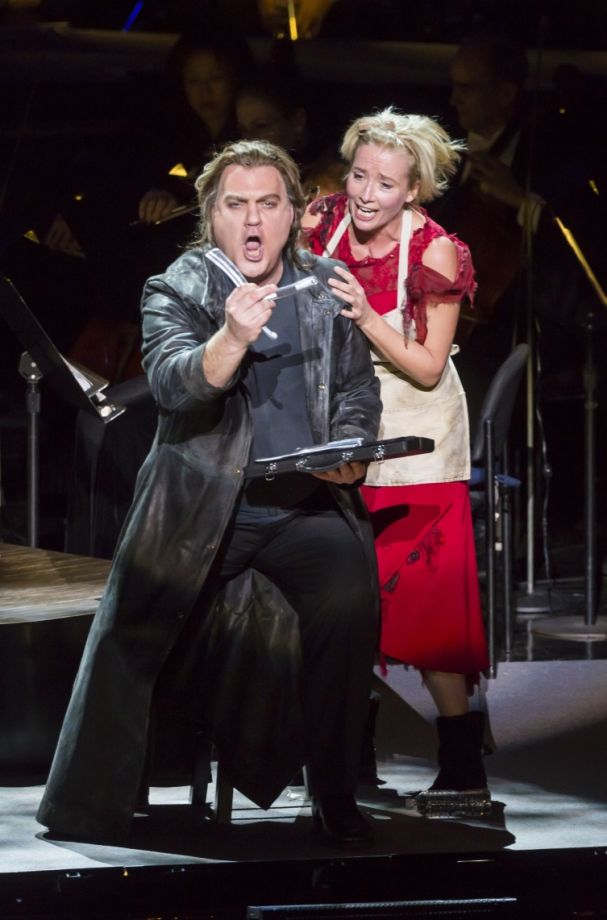Filichia Features: Lonny Price and Sweeney Todd
Filichia Features: Lonny Price and Sweeney Todd
So in 1970, when the nation was entranced with The Carpenters’ “(They Long to Be) Close to You,” Lonny Price was more interested in someone who didn’t necessarily want a girlfriend to be close to him: Bobby in Company.
“Believe it or not,” he said, “I was taken to it when I was 11 years old because my family couldn’t get tickets to Applause. And I fell completely in love with Stephen Sondheim’s music. I always wonder how many successful divorce lawyers can sing ‘Another Hundred People’ because they heard me play it so much in my bunk when I went away to camp.”
Eight years later, Price couldn’t believe his good fortune when he heard that Sondheim’s new musical had a part for a teenager: Tobias, the young lad who worked for an elixir-salesman, was suddenly unemployed when his boss disappeared, was taken in by pie-shop owner Mrs. Lovett and was the first to become suspicious of a man named Sweeney Todd.
Young Price was now facing the formidable trio of Sondheim, director Harold Prince, and conductor Paul Gemignani. Because the show was set in the 19th century, Price would sing one of that era’s greatest hits: “A Wand’ring Minstrel I” from that 1885 smash The Mikado.
“Afterward, I was given sides to read, and my wonderful friend David Wolf who’d come with me sat in one of the first few rows of the orchestra and kept going over and over the sides. Finally Paul Gemignani spun around in the pit and angrily said to us ‘Will you guys shut the hell up?! You’re disturbing everyone!’”
Little did Gemignani know that in fewer than a thousand days Price would be in front of him on stage in Merrily We Roll Along, directed by Prince and singing songs by Sondheim. And could Gemignani have imagined that in 2007 he’d be conducting the revival of 110 in the Shade that Lonny Price would be directing.
No, Price didn’t get Tobias, but that wasn’t his last chance with Sweeney Todd. In 2000, he directed a “Live at the Philharmonic” production with Patti LuPone as the nefarious Mrs. Lovett and George Hearn as the unbalanced Sweeney. Last year he got to do it again with Emma Thompson and Bryn Terfel, and this year, I caught up with him just before he went to London to direct them once more in Sondheim’s 1979 Tony-winning masterpiece.
Price admits that some were surprised to see Thompson in the role. “But ever since I saw her in Me and My Girl,” he said, “I wanted so much to work with her.”
But wasn’t that Maryann Plunkett, you ask? Yes, here on Broadway, but Thompson was the female lead in London.
“Emma comes from the world of improv,” Price said, still sounding astonished at the fact. “She had a variety show on British TV, too. Kenneth Branagh was the one who got her into serious roles. Every time I started work on my next directing project, I always asked myself ‘Is there something for Emma Thompson?’”
This time, there was. “I wrote her a letter out of the blue and she wrote back,” he said. “And she wrote ‘I want you to hear me sing, because after you do, you can get out of this if you want. I won’t be offended but I want you to know what you have and I want it to be something you want, too.’”
Price stopped to beam. “She is everything you’d hope she’d be as a person. I went with her to her singing teacher, where she sang every song in the score. I knew, though, even before she finished ‘The Worst Pies in London’ (Mrs. Lovett’s opening song) that she could do it. We had to work around her shooting Saving Mr. Banks, and yet she was beyond prepared. I loved seeing her make Mrs. Lovett try to curtsey and be high class and not quite do it. And if you give her an idea and say ‘Wouldn’t it be fun if you tried that?’ she’d say yes and then go out and improve it.”
Of course, the situation could have turned out much differently. Although Price is a Tony-nominee and has been a Broadway presence since his dynamic debut as Charley Kringas in Merrily more than a third of a century ago, he would be dealing here with a household name who had not only won an Oscar as Best Actress (Howard’s End) but also one for Best Adapted Screenplay (Sense and Sensibility).
“She didn’t know who I was, but she respected me from the beginning. I’ve found that happens with the best people. I was very much younger than Eli Wallach when I directed him in Visiting Mr. Green, and I’d occasionally say, ‘Would you try something different?’ and he would; then I’d say ‘Which do you like better?’ and he’d say ‘You’re my eyes.’ It’s a good point; when actors fight directors, they should remember they don’t know what it looks like from out front. Bob Fosse, I’m told, was having resistance from someone he was working with, and he settled the argument saying ‘If you were out here, you wouldn’t like it.’”
Price said that actors tend to trust their director – “until you do something that makes you look like an idiot. I remember when I was an actor,” said the 1979-80 Theatre World Award winner, “I and everyone else would believe in the director until there was a moment when we’d all look at each other and could see each other think ‘He doesn’t know what’s he’s doing. We’re on our own here.’ Then we stopped listening. But if the director seems to be intelligent and actors see him making progress with every actor, they trust.”
Thompson came through on Price’s favorite Sweeney moment. “It’s when Mrs. Lovett realizes that she’s going to have to kill Tobias because he knows too much,” he said. “What sadness! She’s made a real connection to him, for he’s the only kind of child she’ll ever have. Although he’s brought out something maternal in her, now she’ll have to kill him -- the only person who’s ever loved her back. Take a look on Emma’s face when she realizes what she’ll have to do. You see what’s going through her head when he puts his head in her lap.”
Price was also thrilled to work with opera star Bryn Terfel, too. “In fact,” he said, “when I did it before, Bryn was supposed to do it but ultimately couldn’t. We were lucky that George Hearn stepped in and recreated the brilliant performance he gave in the original production. Still, I’m glad to see what Bryn could do with the role.”
Fourteen years gives a director plenty of time to change a thing or two. “If you saw the first one, you saw people dressed in black unobtrusively giving the props to Mrs. Lovett. This time I decided to have Mrs. Lovett go scavenging for things.”
Once again, Price’s trademark of raised platforms placed around the stage would be used. “I felt that surrounding the on-stage orchestra would be more exciting,” he said. “Also having the actors run around a lot would give it energy. That would match the power of the music with physicality that was visceral and muscular.”
Some have said that Harold Prince’s original production was too elephantine. Price didn’t think so. “After we did it, Hal came up, smiled and said to me, ‘You agree with me! It’s supposed to be big!’ Yes – the shows he did with Sondheim were painted on very large canvases, while many Sondheim did with James Lapine were miniatures. Hal’s production was operatic, and the largeness of it makes it exciting. And I love musicians, so to hear it with an enormous orchestra is thrilling.”
Many critics may have thought they did Price a favor when they described the event as “semi-staged.” Said Price, “Yes, it’s a hybrid form, but I bristle when they say ‘semi-staged’ because it’s completely staged. It has choreography, too. The only thing it doesn’t have is walls.”
That Sondheim was pleased with his efforts was of course gratifying, but there was another hurdle to jump. This Sweeney would be broadcast, so Sondheim would approve or reject Price’s camera shots.
“When I sent him the cuts, he’d say things like ‘I think you want a wide-shot here.’ Remember, he grew up as an avid movie fan and for a while considered becoming a film editor,” Price said, giving an aren’t-we-lucky-he-didn’t-become-one look. “For a shot when I had Tobias’s face reflected in a trombone, he blatantly said ‘’I hate that.’”
The solution? “I shortened it,” Price conceded.
Price relished getting a second chance with the concert New York saw thirteen months ago. “I considered it my first draft that closed after the third preview,” he said with a smile. “So with thirteen performances in London, I hope it’ll be even better.”
The critics seemed to think so.
"Director Lonny Price wrings every ounce of humour from Stephen Sondheim's masterwork with sight gags galore and a wonderful comic turn from Emma Thompson … The divine Ms. Thompson, with her brilliant timing and comic asides, offers unbridled joy as Mrs. Lovett. She sings the hell out of the score, too." -- Mark Valencia, What’sonStage
"Sweeney Todd is one of the most thrilling works of musical theatre, and it's a treat to hear Stephen Sondheim's infectious, varied score performed by a 58-piece orchestra … Bryn Terfel must surely be the most gifted singer who has everplayed the demon barber of Fleet Street.” -- Henry Hitchings, Evening Standard
"Emma Thompson makes a terrific Mrs. Lovett, hitting just the right balance between endearing naiveté and ruthless amorality, as well as singing meticulously and without affectation." -- Rupert Christiansen, Daily Telegraph
"The evening's chief pleasure lies in the prominence it gives to the performers and Terfel is, in every sense, a massive Sweeney.” -- Michael Billington, Guardian
"Price's production makes one appreciate the score's cleverness and the orchestra, under conductor David Charles Abell, gives each little melodic shimmy a sumptuous quality.” Quentin Letts, Daily Mail.
All those take the sting out of not getting Tobias.
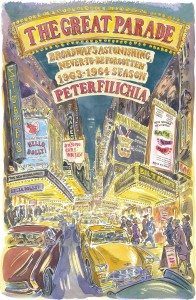
You may e-mail Peter at pfilichia@aol.com. Check out his weekly column each Tuesday atwww.masterworksbroadway.com and each Friday at www.kritzerland.com. His book The Great Parade: Broadway’s Astonishing, Never-To-Be Forgotten 1963-1964 Season is now available at here.
